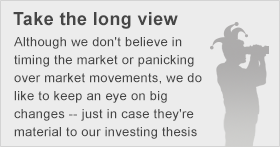
By most accounts, stock market investors enjoyed a good week, with the S&P 500 (^GSPC +0.26%) climbing 1.5% and actually hitting a new intraday record Friday before falling back. Yet many investors are still looking for cracks in the aging bull market, and some believe that the carnage in the biotech industry on Friday could signal a pullback not just for that hot sector but for the market on the whole. Let's take a closer look at biotechs to see what happened and whether investors should worry.
The biotech plunge
Friday was a tough day for biotechs, as the iShares Nasdaq Biotechnology ETF fell almost 5%, erasing gains from earlier in the week. All five of the ETF's largest holdings fell 3% or more, with Biogen Idec (BIIB 0.44%) leading the plunge by falling more than 8%. Regeneron Pharmaceuticals (REGN 1.62%) fell more than 5%, and Gilead Sciences (GILD 2.27%) weighed in with a 4.5% loss on the day.
Nominally, the catalyst for the plunge was a Congressional inquiry into the pricing of certain biotech treatments. In particular, Gilead was asked to explain why it charges $84,000 to U.S. patients for its Sovaldi hepatitis C drug, as lawmakers are concerned about the potential cost to state and federal health-care programs like Medicare and Medicaid, as well as the impact on premiums that private health-insurance companies have to charge.

Source: Wendy, Flickr.
The issue of drug pricing has been controversial for a long time, and it's not unique to biotechs. Regular pharmaceutical companies often charge high prices for their blockbuster drugs, and Sovaldi certainly has blockbuster potential because of its efficacy in actually raising permanent cure rates. Yet Gilead charges prices to patients worldwide based on their national leave of per capita income. As a result, it just agreed to charge patients in Egypt just $900 for the same course of treatment.
It's clear that investors throughout the biotech space sold off shares because of the fear that they won't be allowed to charge enough to recoup their highly risky investments in researching and developing promising treatments. Several biotechs had good news on the fundamental front, with Biogen getting approval for its hemophilia B therapy Alprolix from Health Canada and Celgene (CELG +0.00%) earning FDA approval for its Otezla psoriatic arthritis treatment.
Putting it in perspective
Yet before you panic, consider just how insignificant Friday's biotech drop was in the context of the sector's gains over just the past year. Biogen has still risen more than 80% over the past year, and Gilead is up more than 60% and has tripled since early 2012. Regeneron is also up more than 80% and has risen by more than 2,200% since the March 2009 stock market lows.
From that perspective, any bad news would have been enough to trigger at least a modest pullback. And even though Friday's declines were ugly, they don't change the fundamentals of the sector -- including the huge potential from an aging population and the need to find cures to widespread diseases that not only cause pain and suffering but disrupt countless lives of both patients and those who care for them.
After such a long rally, biotechs could well see a pause in their advances for a while. But as long as they keep producing blockbuster treatments to solve the world's medical problems, biotechs will bounce back in the long run and produce the returns that investors expect from them.








